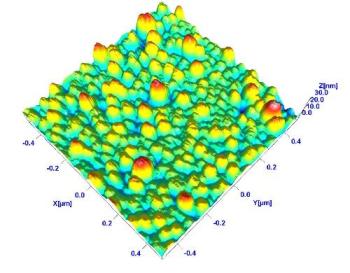Biological Systems Unit of the Okinawa Institute of Science and Technology Graduate University is involved in the development of low-cost and high-efficient waste-fueled microbial fuel cells for real-world applications.
 A 3D atomic force microscope topography image of metallic nanoparticles deposited on graphite.
A 3D atomic force microscope topography image of metallic nanoparticles deposited on graphite.
To achieve this goal, a major challenge remains the development of robust, low-cost electrodes for microbial fuel cells that have better electrical conductivity, corrosion resistance and nontoxic to bacteria that attach to their surfaces. For this purpose, the Biological Systems Unit has joined forces with the Nanoparticles by Design Unit to fabricate and assess a new class of nanoparticle-studded electrodes.
The concept is to apply an ultra-thin layer of a high-cost biocompatible metal over a core of cheap material and then attach the resulting nanoparticles over the surface of a carbon electrode. Besides exploiting the properties of the high-cost metal at a lower cost, this process will enable the electrode to host more number of electricity-generating bacteria by expanding its surface area.
Other scientists have discovered that nanoparticle-studded carbon electrodes are able to increase microbial fuel cells’ electricity output by 20 times more than that can be obtained with plain carbon electrodes. Mukhles Sowwan, Head of Nanoparticles by Design Unit, is attempting to increase the electricity output by testing with different compositions, sizes and techniques of fixing the nanoparticles to the surface of the carbon electrode.
Sowwan believed that this ground-breaking multidisciplinary approach in employing advanced research paves the way to develop high-efficiency microbial fuel cells.